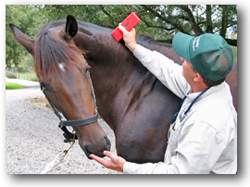
I’m a big proponent of using RFID tags on animals. The company I use for horses is Homeagainid.com but there are several others you should check out.
From the Articlesbase.com website.
Equine Identification is an extremely important asset that should be considered in the overall business plan for ranches. Equine theft has always been a major problem, and with the value of some pure breeds, it is a small price to pay for a valuable asset.
In the past tattooing horses was one of the preferred choices of identification, and accepted by most ranchers and professionals within the equine industry. Since the Mad Cow disease outbreak in 2003, Equine Identification had been included in the USDA National Animal Identification System (NAIS).
Livestock-ID is a blog that provides free content and resources related to animal Identification.
Equine IdentificationEquine is considered a highly valuable livestock, which does not share the same opposition of ranchers for other livestock such as Cattle, Bison, Sheep, Goats, and Pigs.
The costs to microchip horses is considerably less than cattle, because Equine are injected with a glass transponder, where as cattle use ear tags, for their identification. Ear tags generally cost more than glass transponders.
The main benefits of micro chipping horses, is exact identification of equine in the event of a theft, natural disaster, and insurance claims. Being able to identify your horse is the most important aspect.
There are several companies that provide complete equine identification kits, where you could micro chip your horse, and then register all the import details on their national database. This is where the value of micro chipping comes into play.
When the equine is scanned with a Radio Frequency Identification (RFID) reader, the tag id can be searched for in a national database, which records all details of the horse, from date of birth, to the actual owner, and owner’s contact details.
